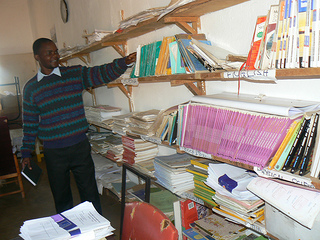Community Day Secondary Schools
Near Zomba, Malawi …In an attempt to improve the education of the children of Malawi in December 1999 the Malawi Ministry of Education Science and Technology announced a “revolutionary” policy to create a new system of schools. Almost overnight it converted scores of Distance Education Centers into Community Day Secondary Schools (CDSS).
In spite of the best of intentions, this program with such promise has stumbled in its effort to meet its goals. This has come about because of the high cost of providing education, the lack of funds, and inadequate buildings and supplies. Books are expensive and scarce, and the government’s desire to supply adequate materials is impractical.
Wilson Tembo, the Manager for the Malawi Project’s warehouse in southern Malawi tells of a recent visit to one of these schools to deliver books and Bibles, “Unlike conventional schools with purpose
In this particular school there are only eight teachers and just one teacher’s house. They must hold their weekly meetings in a grass made shelter in front of the two school blocks. One of the buildings holds a small room that has a very small number of old books.”
It is against this background that the Namikango Mission, in cooperation with the Malawi Project in the U.S., as well as Universal Aide Society and Compassionate Resource Warehouse in Canada, focused recent attention on the Community Day Secondary Schools (CDSSs). During a recent visit to the school 100 books were donated to their meager collection. In his remarks V. Likwangulo thanked all those who took part in the distribution exercise and for making sure we reached to this school. “These books will go a long way in helping our students. These students and the school are unable to procure books and that shortage lead to poor performance by students.”
